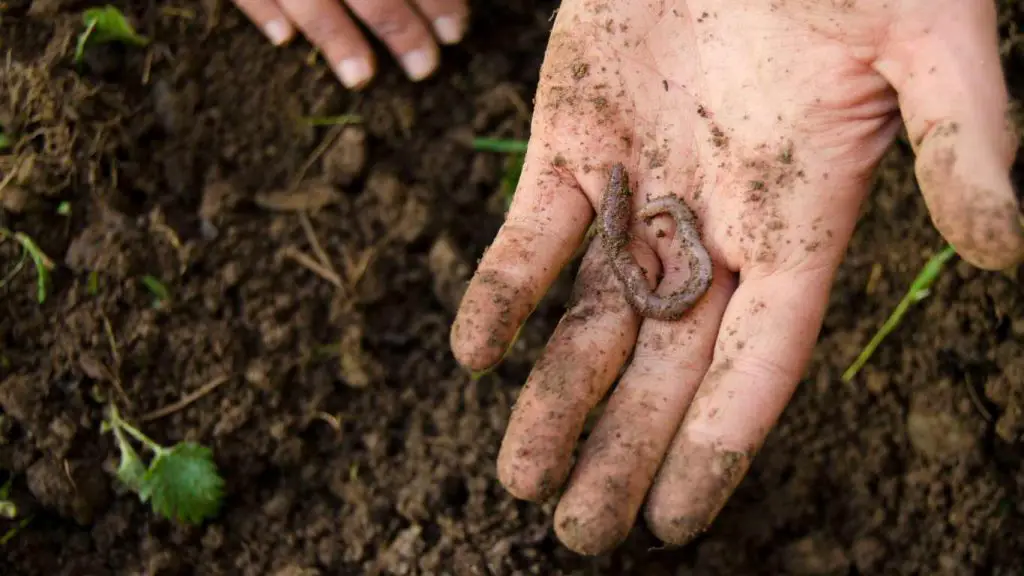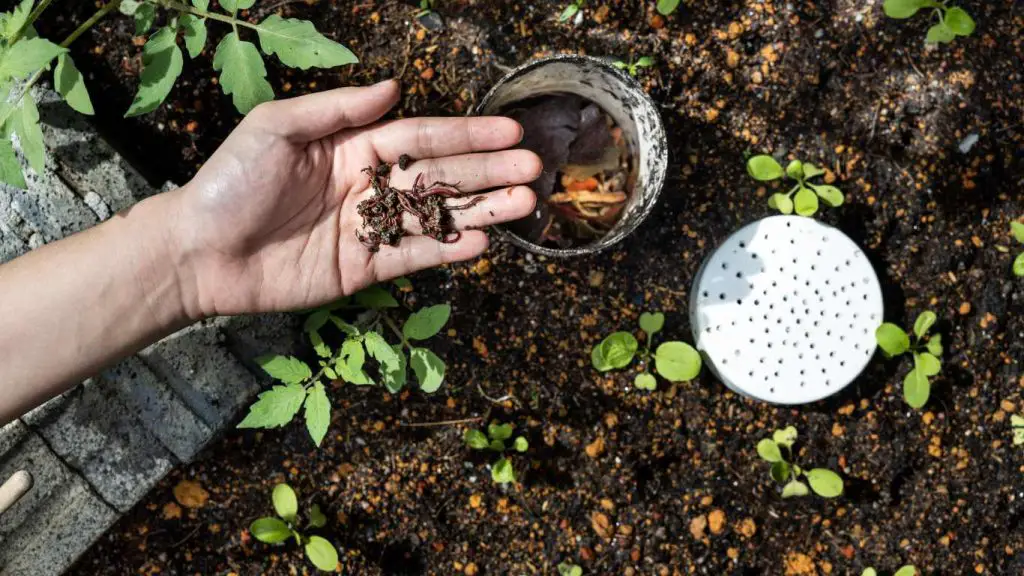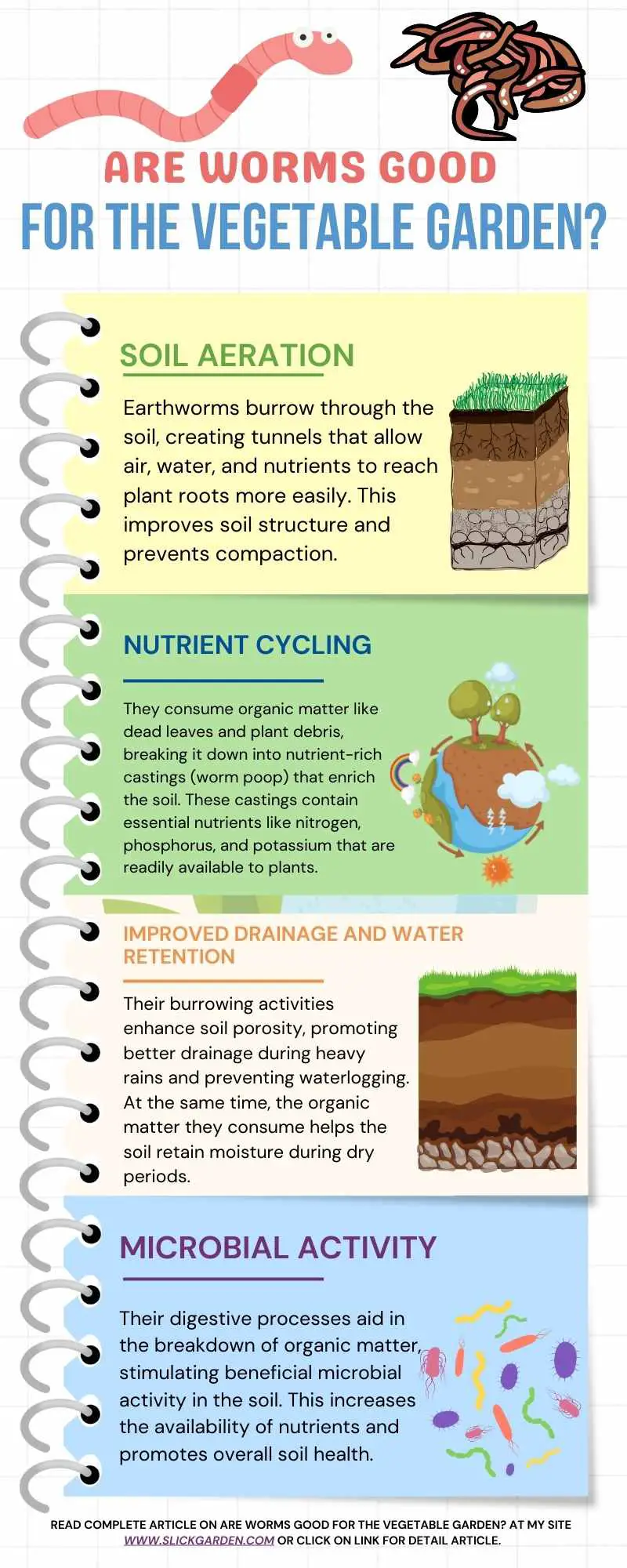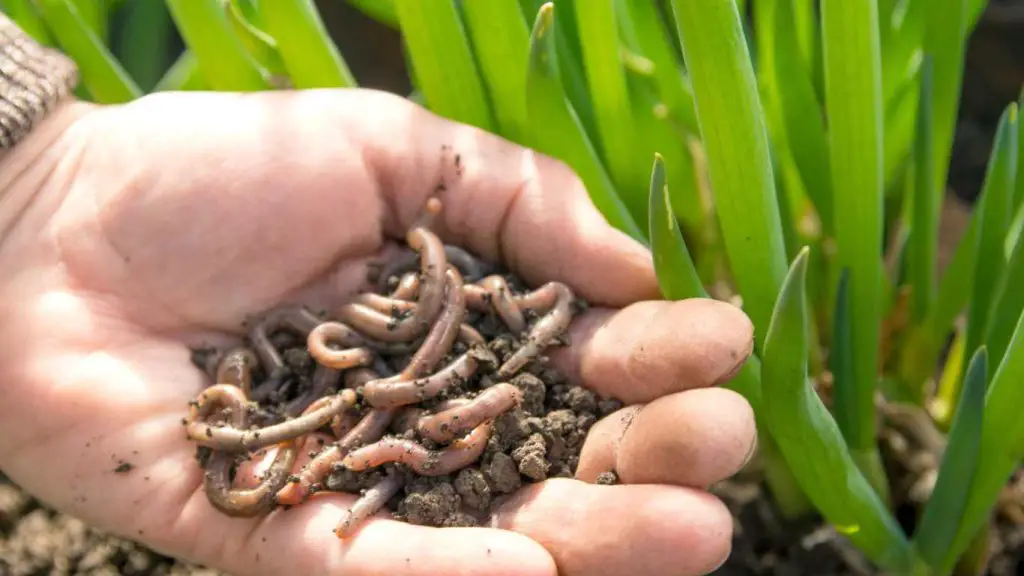Soil is a very important natural resource for the growth of healthy plants. Soil is the foundation of a vegetable garden.
When you grow plants again and again in the same soil then there will be a shortage of nutrients in it. To maintain the nutrient level you have to add organic material such as compost or manure in the soil.

The effects of earthworms in your vegetable garden can be debated. They are significant soil animals that play an agreed role in the sustainability of nutrients.
Earthworms can be the best friend of vegetable plants if they aerate and enrich the soil. They are working as a secret agent on fertilizing and aerating the soil as most of the time you don’t know that they are down below the ground.
If you want to become a successful gardener then you need healthy soil that has microbes like earthworms to create a balanced ecosystem.
What Are Earthworms?
Earthworms live in the soil and consume organic matter. They help to make the soil more fertile. The eggs of the earthworms are wrapped in a protective cocoon.
Five immature worms are hatched in one cocoon. After 6 weeks, they will become mature and their size will reach up to 30 cm. Now they are ready to reproduce and start working in the soil to make it richer. Their life cycle is very easy which helps them to grow quickly.
Earthworms are different from compost worms. Compost worms are only 6 cm long and they live on the surface of the soil. Earthworms live deep in the soil and provide more benefits.
Earthworms don’t have digestive enzymes to break down the organic material. For digestion, they have to mix themselves with mineral soil. Earthworms have to eat 10 to 30 times to meet their calorie needs. Earthworms need a consistent supply of dead roots, leaves, grass, and organic manure.
Why Are Earthworms Good For Vegetable Gardens?

Earthworms take their food from organic matter and excrete so I like waste. This material is packed with nutrients that help to nourish your vegetable plants.
This recycling process provides many benefits to your vegetable garden. Earthworms can burrow down deep in the soil. This will help to improve the structure of the soil. Earthworms break the large clumps in the soil and aerate it. This extra air is best for other microbes.
As you know compacted soil is not good for your plants and the presence of earthworms improves the drainage quality of the soil. After heavy rain, earthworms help to boost water retention.
That’s why the water run-off will be reduced and soil will be protected from erosion.
Following are the benefits you will get when your soil has earthworms.
1. SOIL FORMATION
Wind, rain, and temperature continuously affect the soil. Earthworms help to shape the structure and fertility of the soil. You can also maintain healthy soil in your very vegetable garden without earthworms but their presence makes your soil more productive.
You can use kitchen waste as compost to feed your soil but the presence of earthworms makes your soil more fertile.
2. ASSISTING IN THE DECOMPOSITION
The decomposition of the organic matter in the soil formation is very important. Earthworms like leaves and dead roots. After eating them, they excrete and mix the organic material in the soil.
Earthworms also help in the activity of beneficial fungi and bacteria. The microorganisms break down the organic material into humus.
3. NUTRIENT CYCLING
Earthworms help in the decomposition and maintenance of the fertility of soil. They recycle the nutrients as they are excreted in the form of cast. Fresh casts of earthworms contain high amounts of nutrients.
Earthworms speed up the initial breakdown process of organic material. The amount of nitrogen increases due to earthworms cast. The activity of nitrogenase enzymes is enhanced.
4. IMPROVE SOIL STRUCTURE
Compacted soil is not healthy for the growth of plants. The roots of vegetable plants can’t spread easily in the ground. You can’t grow deep-rooted vegetables such as carrots, radishes, and turnips in compacted hard soil.
Earthworms help to loosen the soil. They create thousands of tunnels in the depths of the soil. Due to these tunnels water and air easily penetrate the soil. Erosion is not a problem when the soil has these secret workers.
5. EARTHWORMS CONTROL SOIL-BORNE PESTS
Earthworms control the growth of pests in the soil. As you know earthworms dig the soil and make it aerate.
They reduce compaction of soil making it difficult for pests to survive. We can’t deny the contribution of earthworms in the regulation of soil-borne pests in the soil.
6. IMPROVE WATER INFILTRATION INTO SOIL AND REDUCE SURFACE RUNOFF
Earthworms improve the drainage quality of the soil. As they make the soil more aerated so water can easily penetrate. It helps to reduce erosion and surface runoff.
If your vegetable garden has earthworms then it can drain up to 10 times more than the soil that has no earthworms. It means earthworms have a notable effect on the amount of water a soil can hold.

Keep Reading:
- Everything You Need To Know About Adding Worms In Your Raised Bed Garden
- 15 Simple And Inexpensive Homemade Fertilizers
- How To Make Liquid Fertilizer From Compost For Vegetables?
Drawbacks Of Earthworms

Everything has good and bad sides. In the same way, earthworms also have some drawbacks. The answer to this question is whether earthworms are good for the garden or not depending upon the situation.
If the soil in your garden is healthy then earthworms assist in improving it more. In case there are pests or diseases in the soil then earthworms do more harm. It is better to consider the condition of the soil before adding earthworms to it.
1. EARTHWORMS CAN CAUSE HARM TO DELICATE ROOTS
Earthworms help to improve chemical, physical, and biological properties in the soil of your vegetable garden but some plants have very delicate roots and earthworms can damage them.
Their presence makes the growth of the plants difficult. In this situation, plants are not able to take water and nutrients from the soil and as a result, they will die.
2. HUNGRY EARTHWORMS CAN STOP THE GROWTH OF NEW PLANTS
You can’t believe earthworms eat newly planted seeds so how can you grow new plants? The new seeds will not germinate and you will not be able to grow new vegetable plants.
3. EARTHWORMS CAN EASILY OVERPOPULATE
Overpopulated areas of earthworms in your vegetable garden are not good. Earthworms like to eat organic matter that is present in the soil. If they eat all the organic matter then what will plants get from the soil? In such a situation earthworms are not good for vegetable plants like weeds.
4. EARTHWORMS CAN ATTRACT RODENT
The presence of earthworms in your vegetable garden attracts different animals and pests like moles and voles.
These animals dig up the soil in your vegetable garden with their small paws and damage the look of your garden. The garden is from an aesthetic standpoint and you should not compromise on its look.
Ways To Attract Worms To Your Garden?
This is the dream of every gardener to improve the health of the soil and we already explained how the worms play an important role in doing this. Earthworms are friends of vegetable plants as they play an important role in the ecosystem.
They provide nutrients in the deep layer of soil and improve richness. The plants absorb these beneficial nutrients and grow fast as a result your crops produce more. Good root penetration and aeration will increase the yield of vegetable crops.
Different environmental factors affect the population of earthworms. If you want to maintain a higher yield of your vegetable crops and want to reduce the fertilizer input then you should work on some factors to achieve your goal. Now we are going to tell you how to attract more worms to improve the richness of the soil.
1- MANAGE SOIL MOISTURE
Moisture is very important for the health of worms if the soil is dry they will die. If you maintain moisture level then they can easily multiply themselves.
It doesn’t mean that you make the soil soggy because waterlogged soil can suffocate them. You should not compromise on the drainage. A reasonable moisture level is suggested for the health of your plants as well as worms.
When you provide a suitable environment to worms they will grow fast and help to provide more nutrients to your plants.
2- INCREASE ORGANIC MATTER
Worms like to eat organic matter and multiply themselves. If you want more worms in your soil then you must add compost in the soil to fulfil their requirements for healthy living.
You can also add green manure and mulch to the soil for better results. The application of mulch helps to maintain the moisture level in the soil and stop the growth of weeds. A consistent supply of organic material makes worms happy.
3- MAINTAIN SOIL pH
Another important factor that you must consider is the pH of the soil. Earthworms don’t like acidic soil. The perfect pH of soil for a healthy population of worms must be between 4.5 to 6.7. The ideal pH helps the worms to increase their number.
4- MINIMISE CHEMICAL USE
Just as chemicals are not good for plants, they are not good for earthworms either. If you use chemical fertilizers and pesticides then they will increase the acidity of the soil and affect the growth of earthworms. You should use chemicals at a minimum level to attract more worms.
5- DON’T DISTURB THE SOIL
Worms make soil more aerated but if the soil is compacted they have to work hard to dig in the soil. After heavy rain, you should avoid walking using heavy machinery on the soil or digging deep. Disturbance is not good for the worms because it can reduce their numbers in the soil.
6- TEMPERATURE
Temperature plays a very important role in the reproduction of earthworms. Fluctuations in the temperature can affect the life cycle of earthworms.
If the temperature is higher than cocoons 10 to hatch solar it will speed up the growth of the population. The tolerance rate of temperature for earthworms may change according to the requirements of the species of earthworms in the soil.
If the weather is dry and hot then earthworms like to go deep in the soil. The metabolism of the earthworms slows down due to the low winter temperature. Spring and autumn is the time when earthworms are most active.
Keep Reading:
